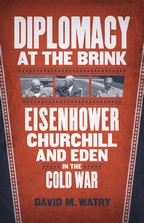A groundbreaking new study of Anglo-American relations during the Cold War, Diplomacy at the Brink argues for a reevaluation of Dwight D. Eisenhower’s foreign policy toward allies and enemies alike. Contrary to his reputation as a level-headed moderate, the Eisenhower who emerges in David M. Watry’s exhaustively researched book is a conservative ideologue, a leader whose aggressively anti-Communist and anticolonialist foreign policies represented a major shift away from the containment policy of the Truman presidency.
Watry contends that Eisenhower worked closely with John Foster Dulles to engage in aggressive brinksmanship that diametrically opposed Winston Churchill’s diplomacy of “peaceful coexistence.” At a time when British economic interests favored cooperation with China, Eisenhower planned nuclear war against it; when Anthony Eden considered Gamal Abdel Nasser a Soviet agent and invaded Egypt, Eisenhower supported Arab nationalism and used economic and political blackmail to force Britain to withdraw. Such stances fractured the “special relationship” between America and Great Britain and played a vital role in the dissolution of the British Empire.
Watry’s thorough examination of the important clash of U.S.–U.K. foreign policy demonstrates that America’s new anti-colonial policies and the unilateral use of American power against perceived Communist threats put Eisenhower and Dulles on a collision course with Churchill and Eden that rocked the world.
David M. Watry is a lecturer in the Department of History at the University of Texas at Arlington.
Praise for Diplomacy at the Brink
“Through masterful use of transatlantic archives . . . . Watry encourages readers to question Eisenhower’s Cold War methods and goals. . . . . Highly recommended.”—CHOICE
“Thought-provoking and well-researched. . . . This is an important and outstanding contribution to the Eisenhower and Cold War historiographies.”—H-Diplo
“Utilizing archival documents, public records, speeches, biographies, and secondary sources, Watry uncovers a strained alliance caused by personal disagreements, British colonial ambitions, and a rabid anti-communist approach by the Eisenhower administration. . . . Watry makes an important contribution to literature on the Cold War.”—International Social Science Review
